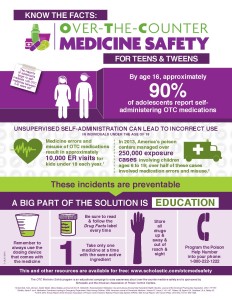Have you talked to your tween or teen about medicine safety lately, or ever? Spring break may provide a perfect opportunity. While they are enjoying sleeping late, homework-less evenings, warmer days filled with springtime allergens, or perhaps for some, being left at home without supervision for the first time, pick a time and initiate a discussion! Your middle schooler may have had some exposure and education on prescription drug safety, but have they learned the potential dangers of medications that are sold over-the-counter (OTC)? Is it really important to teach them to read drug labels or understand proper dosing?
About 50% of children begin self-administering medicines at the age of 11, or 5-6th grade, and over the course of the next 5 years, 90% of them will self-medicate with OTC drugs. Taken according to the directions, these medications are very useful and healthy. The opposite also holds true, in fact OTC medicine mistakes attribute to over 10,000 ER visits by kids under 18 each year. By raising awareness now, the chances of your teen taking more than the recommended dose, or using medications for unintended purposes, can be drastically curbed.
1 in 25 teens report abusing DXM (Dextromethorphan), a common ingredient found in over 100 OTC cold and cough medicines. Without the proper education, your child or student may be influenced by their peers to misuse it too.
OTC Literacy was developed by Scholastic, the American Association of Poison Control Centers, and McNeil Consumer Healthcare. Check out the amazing FREE resources for teachers, families, school nurses and communities. Boy Scouts can earn a patch for their medicine safety efforts as well!
Share your Med Wise experiences, lessons and photos with us on social media!


